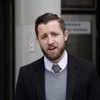Photo by Justin T Gellerson
Advertisement
Thomas Drake: The NSA's focus is on foreign intelligence. It was formed in 1952. People don't realize it was not formed by an act of Congress. It was literally signed into existence by the stroke of a secret presidential pen. That was President Truman. It was the time of Communism, right? The big red threat. Super secret—the joke was it was No Such Agency or Never Say Anything.
What happened after 9/11?The NSA is actually, I believe, culpable in making the infrastructure of modern society and all the things we enjoy far less secure.
Prime Directive was you have to have a warrant. Can't spy on an American without a warrant. It's got to be a legitimate reason, right? You gotta show probable cause. All that was pretty much tossed literally overnight after 9/11. What I was confronted by, within days of 9/11, was that the NSA had been granted verbal authority to turn its extraordinary power of foreign intelligence and now bring that to bear domestically. We don't know where the threat is. It could be anywhere. So the mantra became: We just need the data. Ends justify the means; we just need the data.
Advertisement
Back doors by hook or by crook, and if that means partnerships with certain corporations to build in technology that allows you to have access, if that means weakening encryption standards—which is clear that it has done—then so be it. Which means the NSA is actually, I believe, culpable in making the infrastructure of modern society and all the things we enjoy far less secure.Do you think it actually has combated terrorism properly?
It's actually made it worse. It's part of the paradox of big data. The bigger the haystack, the more needles we can find. Here's the problem: In that mind-set, where all you're going to do is harvest data and you're going to pile it all up in a barn, then how are you going to find the needles? Because in essence, you're turning every straw into a needle, which means there are no needles. Or it becomes that much more difficult to even find the needles, because you can't recognize them as easily.The irony is that the NSA had the data to stop 9/11 and did not focus and prioritize or share it properly with people who could have made the difference. And I know that because this is part of the Pandora's box that I was exposed to. And ultimately that's what I disclosed within channels as a whistleblower to multiple people.Do you think it was worth it?
Yeah, history was at stake. I took an oath to support and defend an idea. Now you can imagine, post- 9/11, what I am confronted by when Pandora's box is opened up, and I'm staring into the abyss. I'm now realizing that I'm going to have to defend the Constitution against my own government. The government itself and the deepest of secrecy are sabotaging the Constitution. It was in essence a silent coup against the Constitution.Can we go back to a state where the government is not spying on us?
I wouldn't have been willing to have this interview with you if I thought we were too far gone. So it's what they always say: It's always darkest before dawn.This story appeared in the September issue of VICE magazine. Click HERE to subscribe.
